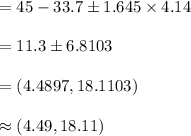
Mathematics, 23.06.2020 10:57, Geo777
Overweight participants who lose money when they don’t meet a specific exercise goal meet the goal more often, on average, than those who win money when they meet the goal, even if the final result is the same financially. In particular, participants who lost money met the goal for an average of 45.0 days (out of 100) while those winning money or receiving other incentives met the goal for an average of 33.7 days. The incentive does make a difference. In this exercise, we ask how big the effect is between the two types of incentives. Find a 90% confidence interval for the difference in mean number of days meeting the goal, between people who lose money when they don't meet the goal and those who win money or receive other similar incentives when they do meet the goal. The standard error for the difference in means from a bootstrap distribution is 4.14.

Answers: 3
Other questions on the subject: Mathematics

Mathematics, 21.06.2019 17:30, fonsworth5
Kathy spent 5/8 of her money on books and another 1/6 of her money on stationeries. what fraction of kathy’s money was left?
Answers: 2

Mathematics, 21.06.2019 23:00, fortnite83
Events a and b are independent. the probability of a occurring is 2/5. the probability of b occurring is 1/4. what is p(a and b)?
Answers: 2

Mathematics, 21.06.2019 23:30, rainbowboi
What is the simplified form of square root of 400 to the 100th power ?
Answers: 1

Mathematics, 21.06.2019 23:30, abell23000
Afriend of mine is giving a dinner party. his current wine supply includes 10 bottles of zinfandel, 8 of merlot, and 11 of cabernet (he only drinks red wine), all from different wineries. (a) if he wants to serve 3 bottles of zinfandel and serving order is important, how many ways are there to do this? ways (b) if 6 bottles of wine are to be randomly selected from the 29 for serving, how many ways are there to do this? ways (c) if 6 bottles are randomly selected, how many ways are there to obtain two bottles of each variety? ways (d) if 6 bottles are randomly selected, what is the probability that this results in two bottles of each variety being chosen? (round your answer to three decimal places.) (e) if 6 bottles are randomly selected, what is the probability that all of them are the same variety? (round your answer to three decimal places.)
Answers: 3
Do you know the correct answer?
Overweight participants who lose money when they don’t meet a specific exercise goal meet the goal m...
Questions in other subjects:

Mathematics, 11.02.2021 02:10

Mathematics, 11.02.2021 02:10





Mathematics, 11.02.2021 02:10

Mathematics, 11.02.2021 02:10












